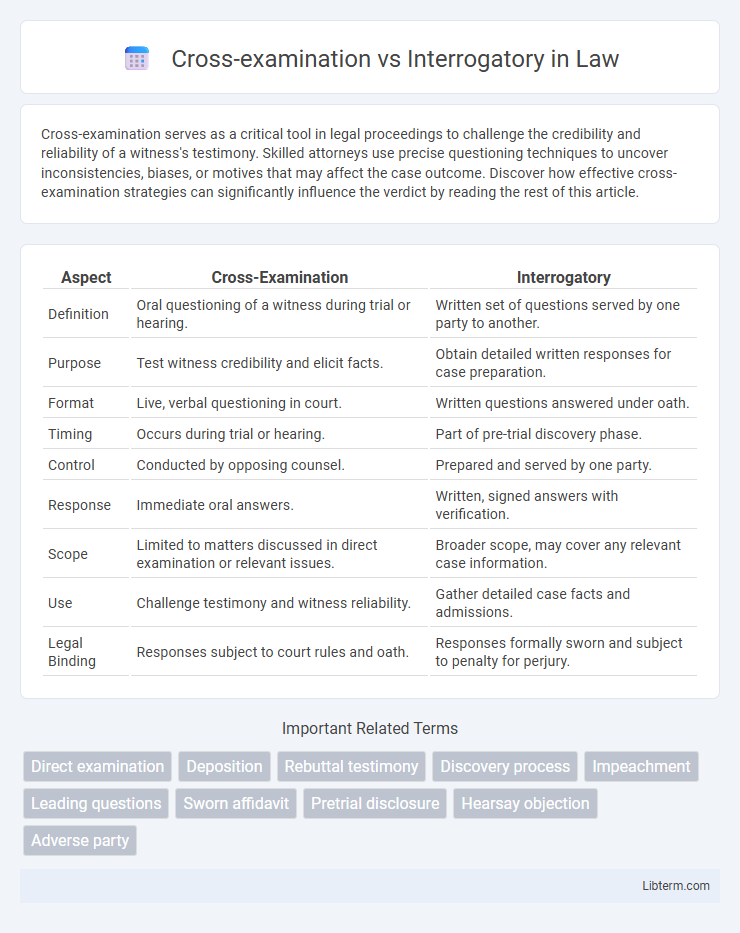Cross-examination serves as a critical tool in legal proceedings to challenge the credibility and reliability of a witness's testimony. Skilled attorneys use precise questioning techniques to uncover inconsistencies, biases, or motives that may affect the case outcome. Discover how effective cross-examination strategies can significantly influence the verdict by reading the rest of this article.
Table of Comparison
| Aspect | Cross-Examination | Interrogatory |
|---|---|---|
| Definition | Oral questioning of a witness during trial or hearing. | Written set of questions served by one party to another. |
| Purpose | Test witness credibility and elicit facts. | Obtain detailed written responses for case preparation. |
| Format | Live, verbal questioning in court. | Written questions answered under oath. |
| Timing | Occurs during trial or hearing. | Part of pre-trial discovery phase. |
| Control | Conducted by opposing counsel. | Prepared and served by one party. |
| Response | Immediate oral answers. | Written, signed answers with verification. |
| Scope | Limited to matters discussed in direct examination or relevant issues. | Broader scope, may cover any relevant case information. |
| Use | Challenge testimony and witness reliability. | Gather detailed case facts and admissions. |
| Legal Binding | Responses subject to court rules and oath. | Responses formally sworn and subject to penalty for perjury. |
Introduction to Cross-Examination and Interrogatory
Cross-examination is a critical phase in legal trials where attorneys question witnesses presented by the opposing party to challenge their testimony and credibility. Interrogatories are written questions sent by one party to another during the discovery process, requiring written answers under oath to gather relevant information before trial. Both tools serve distinct purposes: cross-examination aims to test witness statements in court, while interrogatories facilitate fact-finding through formal written inquiries.
Defining Cross-Examination
Cross-examination is a critical phase in the courtroom where the opposing lawyer questions a witness to challenge their testimony and credibility directly. Unlike interrogatories, which are written questions answered under oath outside of court, cross-examination occurs live, allowing immediate follow-up and observation of witness behavior. This dynamic interaction aims to expose inconsistencies and verify the truth through real-time dialogue.
Defining Interrogatory
An Interrogatory is a formal set of written questions served by one party to another during the discovery phase of litigation, requiring written responses under oath. Unlike cross-examination, which occurs orally during trial to challenge a witness's testimony, interrogatories aim to gather detailed factual information beforehand. Interrogatories help narrow issues for trial by obtaining clear, documented answers that can be used to support or refute claims.
Key Differences Between Cross-Examination and Interrogatories
Cross-examination occurs in court where attorneys orally question witnesses to challenge their testimony, while interrogatories are written questions sent by one party to another during the discovery phase. Cross-examination provides immediate, dynamic interaction and allows for real-time assessment of witness credibility, whereas interrogatories are a slower, more deliberate process relying on written responses under oath. The key differences lie in their timing, format, and the level of spontaneity and control over the information revealed.
Legal Purpose and Objectives
Cross-examination aims to test the credibility and reliability of witnesses by challenging their testimony under oath during trial, ensuring the truth is thoroughly examined. Interrogatories serve as written questions exchanged between parties before trial, designed to gather detailed factual information to build or clarify a case. Both tools strategically facilitate evidence discovery but differ in timing and method to achieve comprehensive case preparation.
Procedures and Legal Frameworks
Cross-examination is a dynamic, in-court procedure allowing attorneys to challenge witness testimony through direct questioning under oath, governed by strict evidentiary rules such as the Federal Rules of Evidence in the United States. Interrogatories are written questions served by one party to another, requiring written, sworn answers within a set timeframe, typically regulated by civil procedure rules like the Federal Rules of Civil Procedure Rule 33. The legal framework for cross-examination mandates live testimony and immediate judicial oversight, while interrogatories are pre-trial discovery tools enabling fact-finding and case preparation without courtroom confrontation.
Use in Civil and Criminal Cases
Cross-examination plays a crucial role in both civil and criminal cases by allowing attorneys to challenge witness credibility and the accuracy of testimony under oath. Interrogatories are primarily used in civil litigation as a discovery tool, involving written questions that must be answered in writing and under oath before trial. While cross-examination is performed live in court to test the opposing party's evidence, interrogatories facilitate fact-finding and case preparation prior to trial.
Advantages and Limitations
Cross-examination allows for immediate assessment of witness credibility and the opportunity to challenge inconsistencies in real-time, offering dynamic interaction and clarity. However, it requires skilled legal expertise, can be time-consuming, and may intimidate witnesses, potentially affecting testimony quality. Interrogatories provide a structured, written format for obtaining detailed information, allowing for thoughtful, documented responses but lack the spontaneous probing characteristic of cross-examination and may be limited by scope and response verifiability.
Strategic Considerations for Lawyers
Cross-examination offers lawyers a dynamic opportunity to challenge witness credibility and elicit impactful admissions under oath, making it pivotal for real-time case strategy adjustments. Interrogatories provide a structured, cost-effective method to gather detailed factual information early in discovery, enabling lawyers to identify weaknesses and refine legal arguments before trial. Balancing the immediacy of cross-examination with the thoroughness of interrogatories enhances overall case preparation and increases the likelihood of favorable outcomes.
Conclusion: Choosing the Right Legal Tool
Cross-examination offers dynamic, real-time assessment of witness credibility, while interrogatories provide detailed, written answers that can be carefully analyzed and referenced. Selecting the right legal tool depends on case complexity, witness reliability, and the need for immediate clarification versus documented responses. Effective litigation strategy often integrates both methods to maximize evidence quality and case strength.
Cross-examination Infographic

 libterm.com
libterm.com